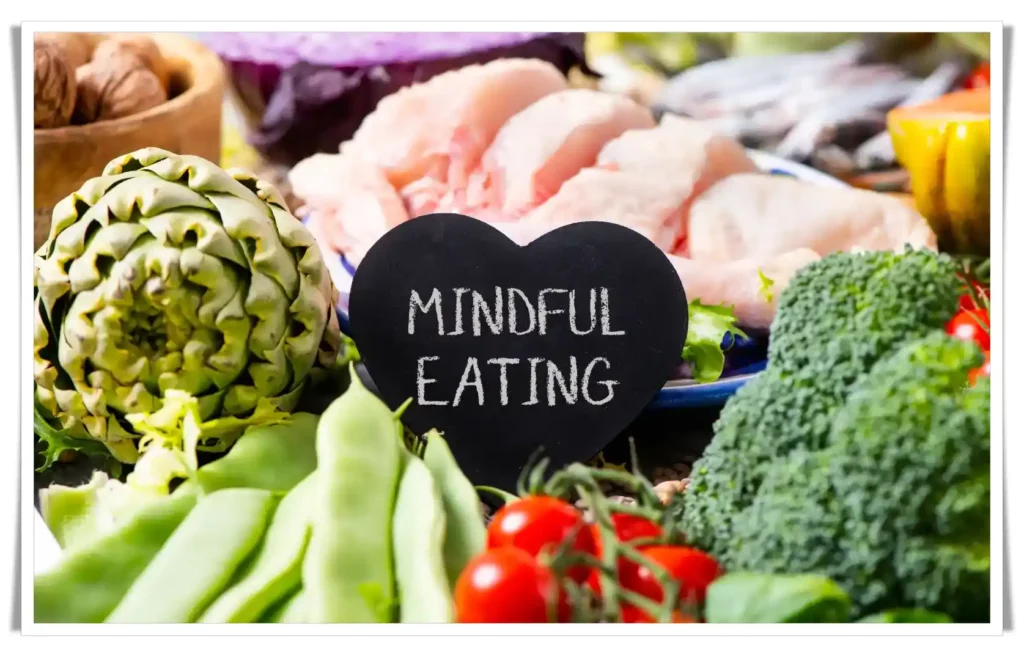From Empty Hearts to Full Plates
Introduction
Have you ever found yourself reaching for that pint of ice cream or bag of chips in moments of stress, loneliness, or sadness? Emotional eating is a phenomenon that affects countless individuals, and it might not be a simple lack of willpower that's causing it. In this article, we'll delve into the often-overlooked link between emotional eating and the lack of love, affection, and attention in our lives. Join us as we uncover the truth behind this complex issue, explore the psychology behind emotional eating, and discuss its impact on our overall well-being.
Empower Your Health Journey – Explore My Free Apps for a Vibrant, Healthier Lifestyle Today!
We'll also share strategies to overcome emotional eating and foster a healthier relationship with food. From building self-awareness and emotional intelligence to developing self-compassion and seeking support from loved ones or professionals, there's hope for breaking free from the grip of emotional eating. Whether you're struggling with this issue yourself or know someone who is, understanding the connection between our emotions and our eating habits is a crucial step toward healing and personal growth. So let's dive in and start untangling the intricate web of emotional eating and its ties to the empty hearts and full plates that affect so many of us.

Uncovering the Truth Behind Emotional Eating
The Psychology of Emotional Eating
Emotional eating is driven by complex psychological factors that go beyond physical hunger. Our brains are wired to seek comfort and pleasure, and food can provide a temporary source of both. When we're feeling sad, lonely, or stressed, we may be more likely to indulge in our favorite comfort foods to soothe our emotional pain. This emotional eating can become a cycle, with emotional distress leading to overeating, followed by guilt and self-blame, which in turn fuels further emotional eating.
Numerous factors contribute to the development of emotional eating habits, including childhood experiences, societal pressures, and individual personality traits. For some, food may have been used as a reward or punishment during childhood, leading to a lifelong association between food and emotions. For others, the pressure to conform to societal standards of beauty and body size may result in feelings of inadequacy and a reliance on food for comfort.
The Role of Love, Affection, and Attention in Emotional Eating
A key factor in emotional eating is the absence of love, affection, and attention in our lives. When our emotional needs aren't being met, we may unconsciously turn to food as a way to fill that void. Food can provide a sense of security and connection, albeit a temporary one. By recognizing the role that love, affection, and attention play in our emotional eating habits, we can begin to address the root cause of the issue and work towards healthier coping mechanisms.
Our relationships with others, and more importantly, with ourselves, play a significant role in our propensity to engage in emotional eating. When we feel loved and supported, we are better equipped to manage our emotions and find healthier outlets for our feelings. Conversely, when we feel unloved or unsupported, food can become a substitute for the emotional connection we crave.
The Impact of Self-Blame and Lack of Willpower
One of the biggest obstacles in overcoming emotional eating is the tendency to blame ourselves for our lack of willpower. While it's true that self-discipline plays a role in managing our eating habits, it's important to understand that emotional eating is a complex issue with deep psychological roots. By acknowledging that emotional eating is not solely a result of personal weakness, we can start to approach the issue with greater self-compassion and understanding, ultimately empowering ourselves to break the cycle and develop healthier coping strategies.

It's crucial to shift our mindset from one of self-blame and guilt to one of self-awareness and self-compassion. By recognizing the underlying emotional triggers that drive our eating behaviors, we can start to develop new, healthier ways of coping with emotional distress. This might include engaging in self-care activities, connecting with supportive friends or family members, or seeking professional help from a therapist or counselor.
In conclusion, understanding the psychology of emotional eating, the role of love, affection, and attention, and the impact of self-blame and lack of willpower is essential for overcoming emotional eating. By addressing these factors, we can take the first steps towards breaking the cycle of emotional eating and developing a healthier, more balanced relationship with food.
The Science Behind Emotional Eating
Understanding the science behind emotional eating is essential for addressing this complex issue effectively. By exploring the biological and psychological factors that contribute to emotional eating, we can better comprehend why we turn to food for comfort and develop strategies to overcome this habit. In this section, we'll dive into a scientific study related to emotional eating and discuss the various factors that play a role in this behavior.
One fascinating study on emotional eating was conducted by Dallman et al. (2003), titled "Chronic stress and obesity: A new view of 'comfort food'". This study highlights the significant impact of chronic stress on our eating habits, particularly our tendency to consume calorie-dense, high-fat comfort foods. According to the researchers, chronic stress disrupts the body's natural hormonal balance, leading to increased production of the stress hormone cortisol. High cortisol levels are associated with an increased appetite for comfort foods, which can temporarily reduce stress by stimulating the release of feel-good chemicals like dopamine and serotonin in the brain.

This study also found that the consumption of comfort foods can dampen the body's stress response, creating a feedback loop that reinforces emotional eating. Over time, this behavior can lead to weight gain and obesity, further exacerbating the emotional distress that initially triggered the emotional eating.
Biological Factors Contributing to Emotional Eating
Several biological factors can contribute to emotional eating, including hormonal imbalances, neurotransmitter activity, and genetic predispositions. As mentioned earlier, elevated cortisol levels play a significant role in driving our appetite for comfort foods. Additionally, the release of dopamine and serotonin in response to consuming these foods reinforces the emotional eating behavior, as these neurotransmitters are associated with feelings of pleasure and reward.
Furthermore, research suggests that certain genetic factors may predispose individuals to emotional eating. For example, some studies have found a link between specific gene variants and an increased risk of emotional eating, particularly in response to stress or negative emotions. While more research is needed to fully understand the genetic factors at play, it's clear that biology plays a significant role in our relationship with food and emotions.
Psychological Factors Contributing to Emotional Eating
In addition to biological factors, various psychological factors contribute to emotional eating. These include our emotional state, childhood experiences, and coping mechanisms. Emotions such as sadness, loneliness, and stress can trigger emotional eating as a way to temporarily alleviate emotional pain. Childhood experiences, like using food as a reward or punishment, can also shape our emotional relationship with food.
Our coping mechanisms also play a crucial role in emotional eating. People with limited or ineffective coping strategies for dealing with emotional distress may be more prone to turning to food for comfort. For instance, individuals who struggle with emotional regulation or have difficulty expressing their emotions may rely on food as a means of self-soothing.

In conclusion, emotional eating is a multifaceted issue influenced by various biological and psychological factors. By understanding the science behind emotional eating, we can better comprehend the reasons behind our cravings for comfort food and develop effective strategies to overcome this habit. Developing healthier coping mechanisms, improving emotional regulation, and addressing any underlying hormonal imbalances can all contribute to a more balanced relationship with food and emotions.
Recognizing the Signs of Emotional Eating
To effectively address emotional eating, it's crucial to recognize the signs and become aware of the triggers that lead to this behavior. By identifying the patterns and habits associated with emotional eating, we can take proactive steps to change our relationship with food and develop healthier coping mechanisms for managing emotions.
Common Triggers for Emotional Eating
- Stress: Stress is a major trigger for emotional eating, as it can lead to hormonal imbalances that increase our appetite for comfort foods. When we're stressed, our bodies produce more cortisol, which in turn drives cravings for high-fat, high-sugar, and calorie-dense foods.
- Negative emotions: Feelings of sadness, anger, loneliness, and frustration can all trigger emotional eating. Turning to food during these emotional states provides temporary relief and comfort, but ultimately perpetuates the cycle of emotional eating.
- Boredom: When we're bored or lacking stimulation, we might turn to food for entertainment or distraction. This type of emotional eating often involves mindless snacking or grazing on unhealthy options.
- Fatigue: When we're tired or sleep-deprived, our bodies crave quick sources of energy, like sugary snacks and carbohydrate-rich foods. This can lead to emotional eating as we seek to boost our energy levels and mood.
- Social situations: Emotional eating can also occur in social settings where food is abundant or when we're influenced by the eating habits of others. In these situations, we might eat to fit in or to alleviate social anxiety.

Identifying Patterns and Habits
To effectively combat emotional eating, it's essential to recognize the patterns and habits associated with this behavior. Here are some steps to help you identify these patterns:
- Keep a food and mood journal: Track what you eat, when you eat, and how you feel before, during, and after eating. This can help you identify patterns and emotional triggers that lead to emotional eating.
- Pay attention to hunger cues: Learn to differentiate between physical hunger and emotional hunger. Physical hunger usually comes on gradually and can be satisfied with any type of food, while emotional hunger tends to come on suddenly and leads to cravings for specific comfort foods.
- Be mindful of your eating habits: Practice mindful eating by paying attention to your hunger and fullness cues, savoring each bite, and eating without distractions. This can help you become more aware of your emotional eating patterns and develop a healthier relationship with food.
- Reflect on past experiences: Consider how your childhood experiences and past relationships may have influenced your emotional eating habits. Understanding the roots of these patterns can provide valuable insights into why you turn to food for comfort and help you develop new coping strategies.

In conclusion, recognizing the signs of emotional eating and identifying the triggers and patterns that drive this behavior are essential steps in addressing the issue. By increasing self-awareness and developing healthier coping mechanisms, we can break the cycle of emotional eating and build a more balanced relationship with food and our emotions.
Strategies for Overcoming Emotional Eating
Successfully overcoming emotional eating involves addressing the underlying emotional needs that drive this behavior. By fostering a healthy relationship with food, building self-awareness and emotional intelligence, developing self-compassion and self-love, and seeking support from loved ones or professionals, we can break free from the cycle of emotional eating and build a more balanced, fulfilling life.
- Fostering a Healthy Relationship with Food
To foster a healthier relationship with food, it's essential to:
- Eat mindfully: Practice being present and aware during meals, savoring each bite, and listening to your body's hunger and fullness cues.
- Avoid labeling foods as "good" or "bad": This can lead to feelings of guilt and shame when we eat "bad" foods. Instead, focus on moderation and balance in your diet.
- Plan regular, balanced meals: This can help prevent impulsive eating and ensure that you're meeting your nutritional needs.

- Building Self-Awareness and Emotional Intelligence
Developing self-awareness and emotional intelligence can help you better understand and manage your emotions, reducing the need to turn to food for comfort. Techniques to improve emotional intelligence include:
- Keeping a journal: Writing down your thoughts and feelings can help you gain insight into your emotions and identify patterns and triggers of emotional eating.
- Practicing mindfulness meditation: This can increase self-awareness and help you become more attuned to your emotions and bodily sensations.
- Developing Self-Compassion and Self-Love
Cultivating self-compassion and self-love can help you break the cycle of self-blame and negative self-talk that often accompanies emotional eating. Some strategies for developing self-compassion include:
- Practicing self-kindness: Treat yourself with the same kindness, understanding, and patience you would offer a close friend or loved one.
- Challenging negative self-talk: Replace self-critical thoughts with more compassionate and supportive statements.
- Engaging in activities that promote self-care: Prioritize activities that make you feel good about yourself and contribute to your overall well-being.
- Seeking Support from Loved Ones or Professionals
Seeking support from friends, family, or mental health professionals can be invaluable in overcoming emotional eating. This support can take various forms, including:

- Sharing your experiences and struggles with trusted friends or family members who can offer understanding, encouragement, and guidance.
- Joining a support group or online community focused on emotional eating or related issues, where you can connect with others who share similar experiences.
- Seeking therapy or counseling from a mental health professional who specializes in emotional eating, disordered eating, or related issues. They can help you develop personalized strategies for addressing the emotional needs that drive your emotional eating behaviors.
FAQ Section
Q: What is the difference between emotional eating and physical hunger?
A: Emotional eating is driven by emotions, such as stress, sadness, or boredom, and often involves cravings for specific comfort foods. Physical hunger, on the other hand, is the body's natural need for sustenance and can be satisfied with any type of food.
Q: Can emotional eating lead to weight gain and health issues?
A: Yes, emotional eating can contribute to weight gain, as it often involves consuming calorie-dense, high-fat, and high-sugar foods. Over time, this can lead to obesity and associated health issues, such as heart disease, diabetes, and certain types of cancer.
Q: How can I tell if I'm an emotional eater?
A: Signs of emotional eating include turning to food for comfort during times of stress, sadness, or boredom, eating when you're not physically hungry, and experiencing guilt or shame after eating.
Q: Can I ever enjoy comfort foods without feeling guilty?
A: Yes, it's essential to recognize that enjoying comfort foods occasionally is a normal part of a balanced diet. The key is to practice moderation and mindfulness when consuming these foods, so they don't become a primary coping mechanism for emotional distress.
Q: What should I do if I'm struggling with emotional eating and need help?
A: Seek support from friends, family, or mental health professionals who can help you address the emotional needs driving your emotional eating behaviors. Developing self-awareness, self-compassion, and healthier coping mechanisms can be instrumental in overcoming emotional eating.
Table 1: Summary
| Strategy | Description | Example |
|---|---|---|
| Mindful Eating | Pay attention to hunger and fullness cues, savor each bite, and eat without distractions | Eating slowly, without watching TV or using a phone |
| Self-Compassion | Treat yourself with kindness and understanding, challenge negative self-talk | Replacing self-critical thoughts with supportive statements |
| Identifying Triggers and Patterns | Recognize situations and emotions that lead to emotional eating | Keeping a food and mood journal to track patterns |
| Building Emotional Intelligence | Develop the ability to understand and manage your emotions | Practicing mindfulness meditation and journaling |
| Seeking Support from Loved Ones | Share your experiences and seek encouragement from friends, family, or professionals | Joining a support group or seeking therapy |
Trustworthy Resources and Further Reading
- HelpGuide.org: Emotional Eating
- Mayo Clinic: Emotional Eating
- National Eating Disorders Association (NEDA): Emotional Eating
- WebMD: Emotional Eating
Table of Top Authority Websites for Emotional Eating Research:
| Website | Description |
|---|---|
| HelpGuide.org | Non-profit guide to mental health and well-being, featuring articles on emotional eating. |
| Mayo Clinic | Leading medical research center and hospital, providing articles on emotional eating. |
| National Eating Disorders Association (NEDA) | Organization dedicated to supporting those affected by eating disorders, including resources on emotional eating. |
| WebMD | Trusted online health information website, offering articles on emotional eating and related topics. |
I Invite my readers to also read:
If you found this article helpful, don't miss my related blog post: Discover the Secret to Eating Right: Mastering Mealtime Mindsets, which dives deeper into developing a healthier relationship with food.
I'd love to hear your thoughts and experiences about emotional eating. Please feel free to leave a comment below, and I'll be sure to respond as soon as possible. Your insights and feedback are invaluable to our community!
Conclusion:
In this article, we've explored the complex relationship between empty hearts and full plates, shedding light on the truth behind emotional eating. We've discussed the psychological and biological factors that contribute to emotional eating and learned that it stems from a lack of love, affection, and attention. By understanding the signs and triggers of emotional eating, we can begin to develop healthier coping mechanisms and foster a better relationship with food.
We also shared valuable strategies for overcoming emotional eating, such as mindful eating, building emotional intelligence, practicing self-compassion, and seeking support from loved ones or professionals. Remember, you are not alone in this journey, and it's never too late to make positive changes.
Together, we can tackle emotional eating and fill our hearts with the love and support we deserve. Keep learning, growing, and seeking the help you need on your path toward a healthier, happier life.







Wow, marvelous weblog structure! How lengthy have you
been blogging for? you make blogging look easy.
The overall glance of your web site is fantastic, let alone the content!
You can see similar: najlepszy sklep and here
sklep
I’m not sure exactly why but this site is loading very slow for me.
Is anyone else having this issue or is it a issue on my end?
I’ll check back later and see if the problem still exists.
I saw similar here: najlepszy sklep and also here:
sklep internetowy